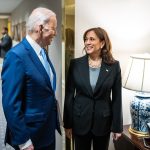Kamala Harris has been touted as a historic candidate, potentially the first Black female to sit in the Oval Office. However, as the November election approaches, her take on race relations is something that can’t be ignored. The silence on her political stance on several key issues begs the question: can a candidate with such an ambiguous record really excite the voters as her party hopes?
A recent piece by Erec Smith, a Cato Institute research fellow, highlights Harris’s dilemma. With many people labeling her a “DEI candidate”—the latest term for those pushing Diversity, Equity, and Inclusion agendas—Harris seems to be caught between pleasing her progressive base and avoiding representative realities of her past. Smith articulates that her previous roles as a prosecutor and attorney general give her a murky political history, making it difficult for her to fully embrace a “woke” platform without risking the fallout from past controversies.
My sister’s relationship with Barack Obama was a harbinger of an America in which race would no longer be a determining characteristic. Kamala Harris and her supporters now say that’s impossiblehttps://t.co/o5T4kiDdtU
— Tablet Magazine (@tabletmag) August 15, 2024
Smith notes that while Harris may want to steer clear of the touchy subject of race, it’s a topic she will have to address, especially with her party’s base looking for a clear signal of where she stands. Yet, the prospect of diving into such choppy waters could very well provide her political rivals with ample ammunition to question her authenticity. According to Smith, Harris needs to tread carefully and perhaps take a page out of former President Barack Obama’s book from the 2008 campaign—after all, he famously framed the conversation around race in a way that ultimately refrained from placing blame, which may seem far removed from Harris’ own fiery rhetoric.
Obama’s 2008 speech, “A More Perfect Union,” was all about healing and understanding. It catered to both sides of the political aisle and, in essence, offered up a warm hug rather than a scolding finger. In contrast, Harris’s comments amidst the George Floyd riots were far from soothing. Daring to assure the nation that the BLM movement would not relent, she fueled divisions rather than unity, suggesting that her earlier, firebrand statements might not mesh well with the calming tone Smith believes she now needs to adopt.
For any aspiring political leader, the risk of an inauthentic pivot on critical topics like race is significant. If Harris opts for a milder approach inspired by Obama, how can she square that with her previously aggressive rhetoric? Voters with long memories won’t let forgotten statements fade away into the ether. The political reality is that Kamala Harris finds herself in a precarious position: the more she tries to soften her image, the more she alienates her radical supporters, while holding on too tightly to the bombastic rhetoric could repel moderates.
As Harris looks ahead to the election, her past statements paired with her current need to balance varying voter expectations presents a tall order. Whether she can pull off a transformation without losing herself in the process remains to be seen. Ultimately, voters are likely to decide if her changes are genuine or just a clever masking of the very radical progressivism that she so enthusiastically championed in the past. It’s a conundrum worthy of a political thriller—if only the stakes weren’t so high.




